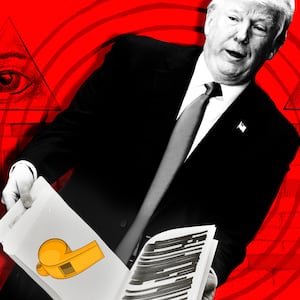Republican lawmakers have sought to hijack several impeachment depositions in a crusade for information on the whistleblower who sparked the inquiry, according to a review of the transcripts by The Daily Beast.
Efforts from Republican lawmakers and their counsel to elicit information on the whistleblower—both by asking leading questions and asking point-blank for the person’s identity—were repeatedly batted down by Democrats, and in one case the attorney of the witness in disputes that became increasingly caustic.
Last week, The Daily Beast reported that Derek Harvey, an aide to Rep. Devin Nunes (R-CA), the ranking member of the House Intelligence Committee, provided notes for House Republicans ahead of the high-profile testimonies of Trump administration appointees with the name of the alleged whistleblower. The goal was that once the transcripts became public, so would the name of the individual.
In one example, during the deposition of Lt. Col. Alexander S. Vindman, the National Security Council’s top Ukraine expert, minority counsel Steve Castor asked flat-out, “Is the whistleblower [redacted]?”
During the deposition of acting Ambassador to Ukraine William Taylor, who had testified that military aid to Ukraine was held up against the wishes of top officials including National Security Adviser John Bolton, Rep. Mark Meadows (R-NC) pressed Taylor for more details on the names of individuals he spoke to at the National Security Council who provided information about Bolton’s thinking on the Ukraine situation.
“I guess I'm a little concerned on who at NSC would've been telling you about Ambassador Bolton,” Meadows said. “You felt like he was a kindred spirit on this. So who was telling you from the NSC that he was?”
Later, Castor asked Taylor if he communicated with or knew of the official that conservative media has identified as the alleged whistleblower. Taylor said he did not know the individual.
Tom Devine, legal director for the Government Accountability Project, said if the effort to out the whistleblower’s identity was successful it’s certainly “a felony” under the Whistleblower Protection Act, though he doubted the Department of Justice would prosecute the offenders.
“It’s an attempt to terrorize other witnesses from providing other testimony,” he said.
“This new tactic is threatening their lives, it’s a terror campaign against anyone bearing witness against the president.”
The legal risks of their attempts to out the individual did little to deter those involved, even as Democrats attempted to thwart their efforts.
Republicans exited certain depositions complaining that House Intelligence Committee Chairman Adam Schiff (D-CA) — who ruled that questions about the whistleblower would be off-limits during the hearings—was shutting down their lines of questioning. That was particularly the case with the testimony of Vindman, who was on Trump’s July 25 call with Ukrainian President Volodymyr Zelensky and who Republicans believed might know the whistleblower.
Though Vindman said in his opening statement that he would not answer questions about the whistleblower’s identity, the released transcripts reveal that Schiff had to cut off Republicans at least five different times over the course of the 10-hour proceeding.
Schiff seemed to get increasingly exasperated as Castor, along with lawmakers such as Rep. Jim Jordan (R-OH) and John Ratcliffe (R-TX), tried different tactics to coax the information about the whistleblower out of the witness, from the blatant—like Castor’s straight-up ask—to the more subtle, like asking which people he might debrief about an important call.
“I am concerned about a bad-faith effort to out a whistleblower who has a statutory right to remain anonymous,” said Schiff, who instructed Vindman that he did not have to answer any question that might have come close to identifying the whistleblower. “We will not be a party to the attacks on the whistleblower. We will not put this whistleblower's life at risk or anymore risk than it already is.”
Minutes later, Schiff and Jordan got into a heated argument when more whistleblower questions came up. Jordan claimed he wanted to protect the whistleblower but went after Schiff for allegedly withholding the person’s name, a charge that leans on the chairman’s admission that the whistleblower first anonymously contacted his committee for guidance on how to file their complaint.
“It doesn't make it any more true the tenth time you said it than the first time.” responded Schiff, “It just means you’re more willful about the false statement?”
The questions also exasperated Vindman’s attorney, Michael Volkov. Later in that deposition, when Castor went at the whistleblower angle again, Volkov asked, “If you want to keep going down this road, we’re going to just keep objecting, OK?”
During a portion of the deposition of former NSC official Fiona Hill, the GOP attorney rattled off a list of several officials, asking Hill if she knew any of them. That portion was largely redacted in the transcript, hiding its contents from public view, but it appeared similar to a tactic used by Castor during Taylor’s deposition to try to narrow the universe of who knew the information contained in the whistleblower complaint.
Visible in the transcript of Hill’s deposition, however, was the attendance of Nunes aide Harvey, who was a colleague of Hill’s on the NSC during the first year of the Trump administration.
While the whistleblower may have very little recourse under the law, Devine noted that the District of Columbia is one of the only jurisdictions where the individual could seek relief from the effort to out them. In order to do so, Devine said, they would need to file a First Amendment suit in District Court, seeking injunctive relief, including a temporary restraining order, against revealing their identity.
“It’s not true they can do this with impunity,” he said. “The assertion that these politicians can engage in this behavior at will is completely false.”
— With additional reporting by Spencer Ackerman









